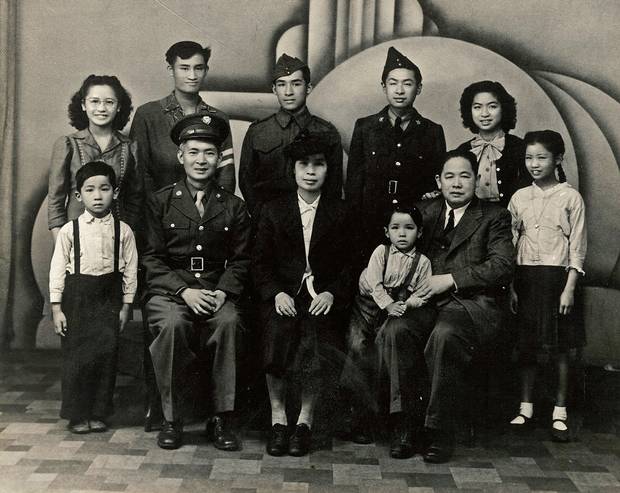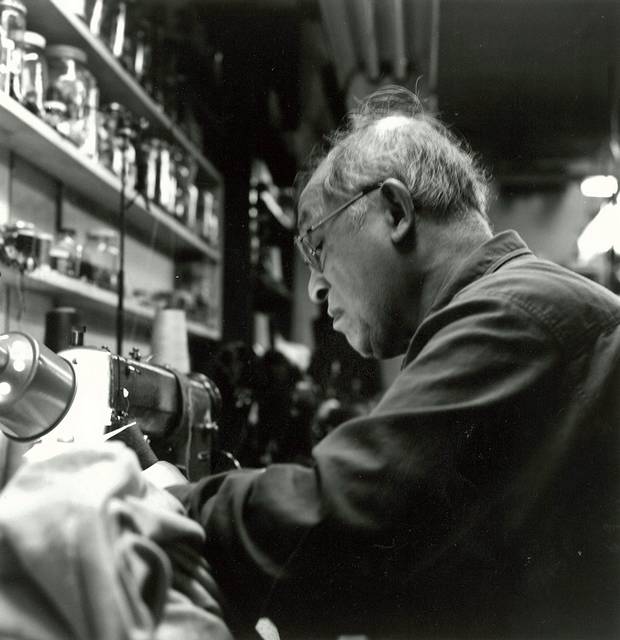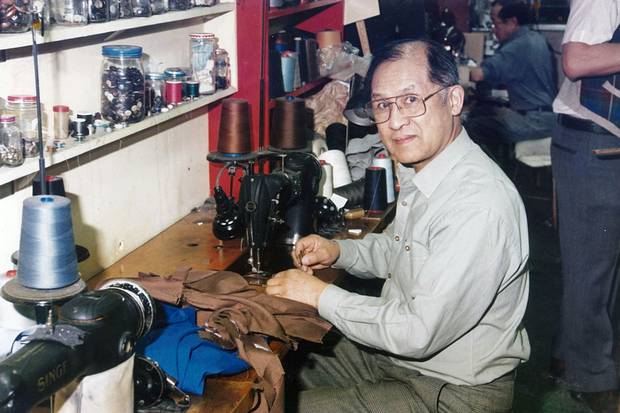After the Second World War ended, Bill Wong graduated from the University of British Columbia as a mechanical engineer along with his brother Jack, a civil engineer. A recruiter from City Hall came to the campus to offer jobs. What he said when he addressed the class in 1948 was crushing to the hard-working Wong brothers, and they never forgot it: "Tell the Chinese boys in the back not to bother applying or we'll all be embarrassed."
Instead of applying elsewhere to work as engineers, they retreated to Modernize, the thriving tailor shop their father opened in Vancouver's Chinatown in 1913. Having worked there part-time since they were teenagers, they were on familiar terms with its ancient Singer sewing machines, antique button-hole maker and enormous steam iron. In its heyday, the shop employed 20 people and stocked hundreds of bolts of high-quality suiting material.
Bill Wong measured and pinned and pressed there six days a week until his death, becoming a Chinatown legend.
He died in Vancouver General Hospital on April 8 of heart failure at the age of 95. Five years ago, he suffered congestive heart failure and was given a pacemaker. (Jack died in 2013.)
Vancouver's nattiest men ordered their made-to-measure suits at his shop, knowing they would get a perfect fit. "It has always been a sign of a real Vancouverite to have a Modernize suit," recalled former Vancouver mayor Sam Sullivan, now a member of the B.C. legislature. "We open our jackets and show each other our badge. My dad used to go there, and I went there to order a suit as mayor in 2006. I felt like I was doing time travel, as if I was a part of history.
"Bill had strong opinions. I'd say: I think I want that colour, and he said, 'No, this is the colour for you.' I always deferred to his judgment."
Among other Modernize clients were loggers from up and down the coast who would pour into town to spend their money and some First Nations customers who would pay for their suits with smoked salmon. There were Hollywood stars such as Arnold Schwarzenegger, Leslie Nielsen and Sean Connery. Mr. Schwarzenegger had dozens of identical suits made for The 6th Day, an action picture he starred in in 2000. Mr. Connery had a white suit made that he subsequently wore in a Japanese TV commercial.

The Wong family in 1946. Bill Wong (back row, third from left) was a student at UBC at the time, and he and his brother Jack (back row, second from left), belonged to the Reserve Officers’ Training Corps.
COURTESY OF THE FAMILY
William Kwanda Wong was born in Vancouver on March 9, 1922, the first of 10 children of Kung Lai Wong and his wife, Man Ming (née Chu), of whom nine survived. Kung Lai Wong had arrived in Vancouver from southern China in 1911 at the age of 20, and had to pay a $500 head tax. He worked for a time as a houseboy then apprenticed himself to an English tailor to learn a trade and open his own shop.
For his staff, Kung Lai imported "paper relatives" from China, bachelor tailors who would never have a chance to marry.
His two eldest boys, Bill and Jack, born a year apart, did everything together. As toddlers, they were allowed to play with scraps of wool and spools of thread at the tailor shop. Later, they would go help out in the shop after attending English school, followed by Chinese school. In 1936, their restless father left the shop in the care of his two brothers and took his sons back to China for a year. In Canton, the boys attended the prestigious Pui Ching Middle School for overseas Chinese students, where they studied history, math, physical education and classical Chinese language instead of the Toisanese dialect spoken in Vancouver. They visited their father's home village, which had no electricity or running water, and met their grandmothers along with an army of Wong relatives. When the school year was over, they helped to build a new two-storey home for Grandmother Wong, paid for by their father.
A diary that Bill kept during that time was translated and published in 2014 under the title A Year in China. The boys sailed home on the Empress of Canada, accompanied by an uncle, just one step ahead of the invading Japanese.
Their father remained a little longer in Hong Kong where, unbeknownst to his sons, he took a second wife – not uncommon then for prosperous Chinese men, though it was hurtful for Man Ming, his wife back in Vancouver.
After the war, their father went to visit his second wife each year, and the couple adopted a daughter named Sabrina. (That story is told in Joanna Wong's self-published book Wong Family Feast.)
Back in Vancouver, Bill and his brother went to Camp Artaban on Gambier Island, sponsored by the YWCA, where he made many friends outside the Chinese community. He spent a summer working at a fish cannery before attending the University of British Columbia. At university, he met the beautiful Zoe Yip, who was studying to become a nurse. They married in 1951 and had four children.
The 1950s, when the brothers took over Modernize, were prosperous years, with some 20 tailor shops operating in Chinatown. The so-called zoot suit was introduced by jazz musicians in the U.S. in the 1940s and became wildly popular with young men in Vancouver a few years later. This louche style called for wide-legged, high-waisted trousers pegged at the ankles and long jackets with wide lapels and exaggerated shoulders. Modernize produced scores of such suits.
They also made costumes for Vancouver's Theatre Under the Stars musical productions and for performances at the historic town of Barkerville in the B.C. interior.
The popularity of the suit began to wane in the 1960s, under the influence of such blue-jean wearing film stars as Marlon Brando. A trend toward informality in office wear followed with the introduction of "casual Fridays." Mass manufacturing of clothing in Asia meant a flood of cheap off-the-rack clothing that had not previously existed.
In Chinatown, the tailor shops disappeared one by one. Still, there were men who appreciated the special alchemy of a well-cut suit made just for them, and Modernize survived. Remarkably, Bill Wong, who practised a system of Korean breathing exercises called SunDo, could still thread a needle in his 80s.
In his 2011 memoir The Measure of a Man, Vancouver writer and broadcaster JJ Lee provided an affecting portrait of Modernize in the 21st century. Mr. Lee apprenticed himself to Bill Wong in 2006 to learn how to alter a suit that had belonged to his abusive, hard drinking father before his death. "I love," he writes, "the thrum of the sewing machines. I love the button jars and the blue box of pins and razor blades. I love the soft thump of the iron and the scrape of the stool leg on the concrete floor. Most of all, I love Bill."
Though JJ Lee lasted only a year at Modernize, he paints Mr. Wong as an artist, a thinker and problem solver, a wise father figure who was the heart of the business.
Mr. Wong was also the subject of a documentary film, Tailor Made: Chinatown's Last Tailors by Len Lee and Marsha Newbery, which aired on CBC Newsworld in 2008.
He lived through enormous changes in the status of Chinese people in Canada, from the time of head taxes, not lifted until 1923, and the Chinese Exclusion Act that followed the same year, designed to stop all immigration. When he was a boy, Chinese people could not use public swimming pools and could work in only a limited number of occupations. Even if born in Canada, they could not vote.
Mr. Wong never expressed bitterness at the prejudice that had kept him from working as an engineer. "I think when you look back, I'm better off this way, because we had a going concern," he told the Vancouver Sun in 2007, after moving the tailoring shop back to its original location at 5 Pender St. from 511 Carrall St., across the street. "We were very successful. If I had gone into engineering I'd have been sent out to the sticks, and you're just on for that particular job. Once that project is over, you've got to start looking for something else. This way, I think my family life is much better."
Among his younger siblings was a financier and philanthropist (Milton Wong), a dentist (Maurice), an artist who lived in New York (Anna), a teacher (Helen) and lab technician (May).
"Bill and Jack were the pathfinders for our family," commented Maurice Wong, the youngest brother. "Milton went into the financial world in Toronto, I went to Dalhousie. The vote for Asians came in 1947 and it was a seismic change. I remember our father putting on his best suit and proudly going off to vote. We were able to participate in Canadian society after that."
Bill Wong is survived by his wife of 66 years, Zoe; his children Steven, Glenna, Susan and Peter; and grandchildren, Karen and Michael. Of his many siblings, only his brother Maurice Wong and sister May remain, in addition to stepsister Sabrina in Hong Kong.

Bill Wong at his machine in the early 2000s. Vancouver writer JJ Lee apprenticed himself to Mr. Wong in 2006, and wrote about the experience in his 2011 memoir The Measure of a Man. ‘I love the thrum of the sewing machines. I love the button jars and the blue box of pins and razor blades. I love the soft thump of the iron and the scrape of the stool leg on the concrete floor. Most of all I love Bill.’
ROSS HOLMES PHOTO
LOVED ONES LOST
MORE FROM THE GLOBE AND MAIL




